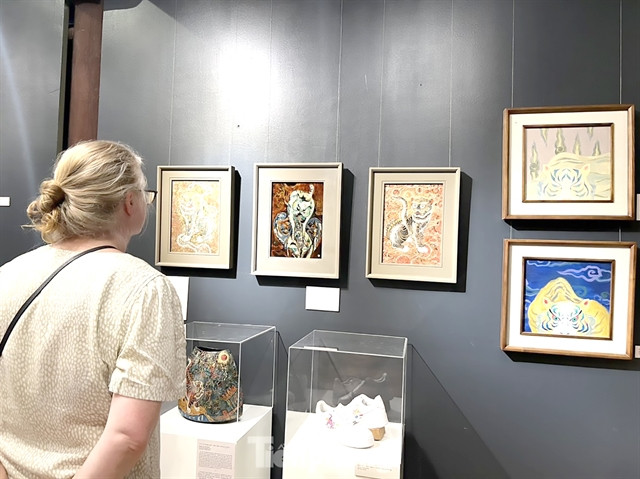The exhibition, Đối Thoại Với Dòng Tranh Dân Gian Hàng Trống (Dialogue with Hàng Trống Folk Painting), displays some of 70 artworks including 29 Hàng Trống folk paintings.
"Hàng Trống painting is one of the unique folk painting styles of Việt Nam," said Lê Xuân Kiêu, director of the centre.
"It symbolises the aesthetics and cultural values of Hanoians in the past. The artworks at the exhibition show their efforts to preserve and develop the value of the folk genre. It will also motivate the younger generation to learn and inherit the traditional artistic quintessence of their ancestors."
The art has been linked to the rituals of ancestor worship. At first, the paintings flourished with the development of Buddhism. Since then, people have realised that the paintings symbolise happiness and prosperity, and hang them during Tết (Lunar New Year Festival).
Worship and Lunar New Year are the main themes of Hàng Trống paintings which depict kings, lords, the Buddha, saints and children. Three gods symbolising longevity, prosperity and happiness are also featured.
Tết paintings depict a joyful life and hang on the walls of houses. While worship paintings are often displayed in pagodas or temples in the north. The colours of these paintings may have faded over time, but they are still an important part of worship rituals.
Each Hàng Trống painting is made by hand. A picture with clean lines, a balanced layout, and cheerful colours meets the artistic standards. The more sophisticated the technique is, the more valuable the picture.
 |
| A visitor looking at the artworks at the exhibition. — Photo tamviet.tienphong.vn |
A painting by Lê Đình Nghiên is a highlight of the exhibition. Featuring the theme of worship, the painting depicts Mẫu Thượng Thiên (Mother Goddess of Heaven).
Nghiên is considered the last and only artisan of Hàng Trống painting. From his childhood, he followed his grandfather and his father to Hàng Trống Street in Hà Nội to make paintings.
From this, he learned all the techniques handed down from his father and grandfather. He worked on the restoration of folk paintings at the Việt Nam Museum of Fine Arts, then continued his pursuit by making Hàng Trống paintings in his own style.
As the folk painting gradually faded, he still painstakingly painted, restored and brought these paintings to sell at Tết markets in order to preserve traditional culture.
Over his 50 years of work, he never stops sharpening his techniques and improving the engraving moulds to create a personalised version of the folk paintings.
"I have seven brothers and sisters but only I, and now my son, followed my family's traditional career," said Nghiên.
"It is difficult to preserve a traditional craft in the context of the mushroom growth of high technology."
Other silk, lacquer, and oil paintings by artists from the project "From Tradition to Tradition" are displayed with a selection of Hàng Trống paintings.
The exhibition runs until July 31 at the Temple of Literature. — VNS